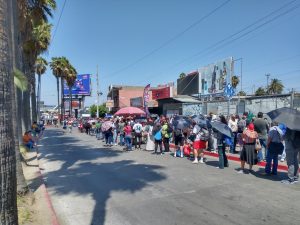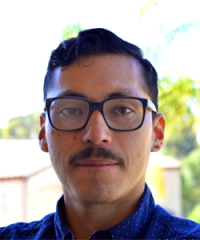Miguel A. Avalos (Sociology) is a 2023–2024 HRI Graduate Fellow. Avalos’s interdisciplinary dissertation project, “Limitrophic Dwelling: Home, Temporal Sequestration, and the U.S.- Mexico Border Regime,” explores the unintended consequences of transborder commuting or the practice of frequently traveling between a Mexican and U.S. border city.
Learn more about HRI’s Campus Fellowship Program, which supports a cohort of faculty and graduate students through a year of dedicated research and writing in a collaborative, interdisciplinary environment.
What is unique about your research on this topic?
With some exceptions, research on U.S. immigration enforcement practices, policies, and institutions often uses a spatial lens when examining migrants’ or refugees’ experiences along the U.S.-Mexico borderlands or within the United States. This scholarship importantly demonstrates how U.S. immigration enforcement directly or indirectly exposes these vulnerable communities to various forms of racialized, gendered, and sexual violence.
My dissertation research aims to extend this scholarship in several ways. First, I foreground border residents’ experiences with U.S. immigration enforcement in the San Diego-Tijuana border region. I specifically focus on transborder commuting between Tijuana, Mexico, and San Diego, California, among Latine/x border residents. Transborder commuters residing in Tijuana, for example, may commute daily to attend school or work in San Diego County and, in so doing, must travel through a U.S. land port of entry, often having to anticipate waiting there 2–4 hours before entering the United States. Second, I incorporate time and queerness as conceptual lenses to demonstrate how U.S. border enforcement institutions use waiting to regulate cross-border mobilities and reveal how this temporal regulation impacts transborder commuters’ control over their commutes and queers their daily lives. Third, I explore how transborder commuting redefines normative understandings of home and belonging in what I argue is a transnational space characterized by shorter distances, that is, a border region.

What drives your interest in this research?
My research is informed by my childhood experiences as a transborder commuter and my general connections to the U.S.-Mexico borderlands. I was born in San Diego, but I grew up in Tijuana until moving to Orange County to begin elementary school in the United States, moving and settling down in the San Diego-Tijuana border region after two years. My interest is also informed by a desire to foreground San Diego-Tijuana border residents’ experiences in mainstream and scholarly discussions and debates regarding U.S. immigration policies and their repercussions for people who live along the U.S.-Mexico borderlands. Their perspectives are vital to understanding the impact of U.S. immigration policies and practices and how they differentially impact Afro Latine/x and Latine/x communities along citizenship categories.
How has the fellowship seminar impacted the way you approach your research?
The fellowship seminar allowed me to see different ways of framing my dissertation’s analyses, revealing new connections that strengthen my arguments. The faculty and graduate student fellows’ provocative questions and insightful comments about one of my dissertation chapters have implications for the chapter’s discussion and my dissertation. It has been an encouraging and motivating experience, one I will cherish and look back on as a pivotal experience in my graduate studies at UIUC.
